|
Islam Has Brought Peace and Harmony to the Middle
East
History always witnessed
peace, justice and tolerance in the lands ruled
by Muslim administrators when they followed Qur'anic
guidance. The practices in the lands conquered
during the lifetime of the Prophet Muhammad are
very important examples, and just administrators
succeeding him, who followed in the footsteps
of God's messengers and never swerved from the
morality of the Qur'an established peaceable societies.
The true justice, righteousness and honesty described
in the Qur'an persisted in the time of these administrators,
thereby providing a role model for the succeeding
generations to follow.
The land of Palestine and its capital Jerusalem,
where members of the three divine religions reside
together, are important in the sense that they
show how Muslims bring peace and stability to
the lands they rule. Indeed, for most of the last
1400 years, Muslim rule has brought peace to Jerusalem
and Palestine.
The Peace and Justice Brought
to Palestine by the Caliph Umar
Jerusalem was the capital of the Jews until A.D.
71. In that year, the Roman Army made a major
assault on the Jews, and exiled them from the
area with great savagery. As the time of the Jewish
diaspora began, Jerusalem and the surrounding
area was becoming an abandoned land.
However, Jerusalem once again became a centre
of interest with the acceptance of Christianity
during the time of the Roman Emperor Constantine.
Roman Christians built churches in Jerusalem.
The prohibitions on Jews settling in the region
were lifted. Palestine remained Roman (Byzantine)
territory up until the 7th century. The Persians
conquered the region for a short time, but the
Byzantines later reconquered it.
An important turning point in the history of
Palestine came in the year 637, when it was conquered
by the armies of Islam. This meant new peace and
harmony in Palestine, which had for centuries
been the scene of wars, exile, looting and massacre,
and which saw new brutality every time it changed
hands, a frequent occurrence. The coming of Islam
was the beginning of an age when people of different
beliefs could live in peace and harmony.
 The Mosque of Omar
(also called Dome of the Rock) and Al-Aqsa
Mosque directly behind it.
The Mosque of Omar
(also called Dome of the Rock) and Al-Aqsa
Mosque directly behind it. |
Palestine was captured by Umar, the second Caliph
after the Prophet himself. The entry of the Caliph
into Jerusalem, the tolerance, maturity and kindness
he showed towards people of different beliefs,
introduced the beautiful age that was beginning.
The British historian and Middle East expert Karen
Armstrong describes the capture of Jerusalem by
Umar in these terms in her book Holy War:
The Caliph Omar entered Jerusalem mounted on
a white camel, escorted by the magistrate of the
city, the Greek Patriarch Sophronius. The Caliph
asked to be taken immediately to the Temple Mount
and there he knelt in prayer on the spot where
his friend Mohammed had made his Night Journey.
The Patriarch watched in horror: this, he thought,
must be the Abomination of Desolation that the
Prophet Daniel had foretold would enter the Temple;
this must be Antichrist who would herald the Last
Days. Next Omar asked to see the Christian shrines
and, while he was in the Church of the Holy Sepulchre,
the time for Muslim prayer came round. Courteously
the Patriarch invited him to pray where he was,
but Omar as courteously refused. If he knelt to
pray in the church, he explained, the Muslims
would want to commemorate the event by erecting
a mosque there, and that would mean that they
would have to demolish the Holy Sepulchre. Instead
Omar went to pray at a little distance from the
church, and, sure enough, directly opposite the
Holy Sepulchre there is still a small mosque dedicated
to the Caliph Omar.
The other great mosque of Omar was erected on
the Temple Mount to mark the Muslim conquest,
together with the mosque al-Aqsa which commemorates
Mohammed's Night Journey. For years, the Christians
had used to the site of the ruined Jewish Temple
as the city rubbish dump. The Caliph helped his
Muslims to clear the garbage with his own hands
and there Muslims raised their two shrines to
establish Islam in the third most holy city in
the Islamic world.21
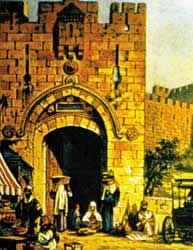 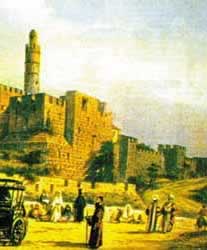 Under Muslim rule,
Muslims, Christians and Jews lived together
in Jerusalem in contentment, tolerance and
peace.
Under Muslim rule,
Muslims, Christians and Jews lived together
in Jerusalem in contentment, tolerance and
peace. |
With the Muslim conquest of Jerusalem, the city
became a safe haven in which all three religions
could co-exist in peace. John L. Esposito writes:
When the Arab armies took Jerusalem in 638, they
occupied a center whose shrines had made it a
major pilgrimage site in Christendom. Churches
and the Christian population were left unmolested.
Jews, long banned from living there by Christian
rulers, were permitted to return, live, and worship
in the city of Solomon and David.22
When Caliph Umar entered Jerusalem, he signed
the below agreement with the Patriarch of Jerusalem:
This is the security which Umar, the servant
of God, the commander of the faithful, grants
to the people of Ælia. He grants to all, whether
sick or sound, security for their lives, their
possessions, their churches and their crosses,
and for all that concerns their religion. Their
churches shall not be changed into dwelling places,
nor destroyed, neither shall they nor their appurtenances
be in any way diminished, nor the crosses of the
inhabitants nor aught of their possessions, nor
shall any constraint be put upon them in the matter
of their faith, nor shall any one of them be harmed.23

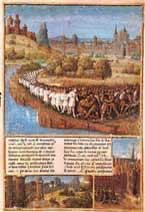
The Muslims and Jews of Jerusalem were brutally
massacred by the Crusaders. |
In short, Muslims brought civilisation to Jerusalem
and all of Palestine. Instead of beliefs that
showed no respect for other peoples' sacred values,
and which killed them simply out of differences
of faith, there reigned the just, tolerant and
moderate culture of Islam. After its capture by
Umar, Muslims, Christians and Jews lived together
in peace and harmony in Palestine. Muslims never
tried to use force to make people convert, although
some non-Muslims who saw that Islam was the true
religion did so of their own free will.
The peace and harmony in Palestine lasted as
long as Muslim rule in the region. However, at
the end of the 11th century, a conquering force
entered the region from abroad, and the civilised
land of Jerusalem was barbarically and savagely
plundered, in a way never before seen. These barbarians
were the Crusaders.
The Savagery of the Crusaders
While members of all three religions were living
peaceably together in Palestine, the Christians
in Europe decided to organise a crusade. Following
a call by Pope Urban II on 27 November 1095 at
the Council of Clermont, more than 100,000 people
from all over Europe set out for Palestine to
free the Holy land from the Muslims and find the
fabled wealth of the East. After a long and wearying
journey, and much plundering and slaughter along
the way, they reached Jerusalem in 1099. The city
fell after a siege of nearly five weeks, and the
Crusaders moved in. And they carried out a savagery
the like of which the world has seldom seen. All
Muslims and Jews in the city were put to the sword.
The peace and harmony in Palestine, which had
lasted since Umar, ended in terrible slaughter.
The Crusaders violated all the ethical laws of
Christianity, a religion of love and compassion,
and spread terror in the name of Christianity.
The Justice of Saladin
The barbaric Crusader army made Jerusalem their
capital, and established a Latin Kingdom whose
borders stretched from Palestine to Antioch. However,
the Crusaders who brought savagery to Palestine
did not last long. Saladin gathered all the Muslim
kingdoms under his banner in a holy war, and defeated
the Crusaders at the battle of Hattin in 1187.
After the battle, the two leaders of the crusader
army, Reynald of Chatillon and King Guy, were
brought into Saladin's presence. Saladin executed
Reynald of Chatillon, who had become infamous
for the terrible savagery he had committed against
Muslims, but he let King Guy go, as he had not
committed the same crimes. Palestine once again
saw the true meaning of justice.
Immediately after Hattin, and on the very same
day that the Prophet Muhammad had been taken from
Mecca to Jerusalem in one night, the day of the
Ascent, Saladin entered Jerusalem and freed it
from 88 years of Crusader occupation. When the
Crusaders took the city 88 years earlier, they
killed all the Muslims inside it, and for that
reason they were afraid that Saladin would do
the same thing to them. However, he did not touch
even one Christian in the city. Furthermore, he
merely ordered the Latin (Catholic) Christians
to leave it. The Orthodox Christians, who were
not Crusaders, were allowed to live in the city
and worship as they chose. In the words of John
L. Esposito, "The Muslim army was as magnanimous
in victory as it had been tenacious in battle.
Civilians were spared; churches and shrines were
generally left untouched... Saladin was faithful
to his word and compassionate toward noncombatants."
24
 King Richard - the
"Lion Heart" - ruthlessly executed 3000
Muslim civilians in the Castle of Acre,
among whom were many women and children.
King Richard - the
"Lion Heart" - ruthlessly executed 3000
Muslim civilians in the Castle of Acre,
among whom were many women and children.
|
Karen Armstrong describes the second capture
of Jerusalem in these words:
On 2 October 1187 Saladin and his army entered
Jerusalem as conquerors and for the next 800 years
Jerusalem would remain a Muslim city. Saladin
kept his word, and conquered the city according
to the highest Islamic ideals. He did not take
revenge for the 1099 massacre, as the Qur'an advised
(16:127), and now that hostilities had ceased
he ended the killing (2:193-194). Not a single
Christian was killed and there was no plunder.
The ransoms were deliberately
very low... Saladin was moved to tears by the
plight of families who were rent asunder and he
released many of them freely, as the Qur'an urged,
though to the despair of his long-suffering treasurers.
His brother al-Adil was so distressed by the plight
of the prisoners that he asked Saladin for a thousand
of them for his own use and then released them
on the spot... All the Muslim leaders were scandalised
to see the rich Christians escaping with their
wealth, which could have been used to ransom all
the prisoners
[The Patriarch] Heraclius paid
his ten-dinar ransom like everybody else and was
even provided with a special escort to keep his
treasure safe during the journey to Tyre.25
In short, Saladin and the Muslims in his command
treated the Christians with great mercy and justice,
and even showed them more compassion than their
own leaders had. Not only the Christians but also
Jews attained peace and security with the conquest
of Jerusalem by Muslims. The well-known Spanish-Jewish
poet Yehuda al-Harizi expressed his feelings thus
in one of his works:
God
decided that the sanctuary would no longer
rest in the hands of the sons of Esau... Thus
in the year 4950 of Creation [AD 1190] God aroused
the spirit of the prince of the Ishmaelites [Salah
al-Din], a prudent and courageous man, who came
with his entire army, besieged Jerusalem, took
it and had it proclaimed throughout the country
that he would receive and accept the race of Ephraim,
wherever they came from. And so we came from all
corners of the world to take up residence here.
We now live in the shadow of peace.26
After Jerusalem, the Crusaders continued their
barbarity and the Muslims their justice in other
cities in Palestine. In 1194, Richard the Lionheart,
who is portrayed as a great hero in British history,
had 3,000 Muslims, among whom were many women
and children, basely executed in Castle Acre.
Although the Muslims witnessed this savagery,
they never resorted to the same methods. They
abided by God's command "Let
not the hatred of a people [who once] obstructed
you from the Sacred Mosque lead you to transgress..."
(Qur'an, 5:2) and never used violence against
innocent civilians. They never employed unnecessary
violence, not even against the Crusader armies
they defeated.
The savagery of the Crusaders and the justice
of the Muslims once more revealed a historic truth:
An administration built on the principles of Islam
allowed people of different faiths to live together.
This fact continued to be demonstrated for 700
years after Saladin, particularly during the Ottoman
period.
The Ottoman Empire's Just
and Tolerant Rule
In 1514, Sultan Selim captured Jerusalem and
the surrounding area, and some 400 years of Ottoman
rule in Palestine began. As in other Ottoman states,
this period would enable Palestine to enjoy peace,
stability, and the living together of different
faiths.
The Ottoman Empire was administered under what
is known as the "nation (millet) system", the
fundamental feature of which was that people of
different faiths were allowed to live according
to their own beliefs and even legal systems. Christians
and Jews, described as the People of the Book
in the Qur'an, found tolerance, security and freedom
in Ottoman lands.
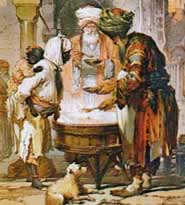 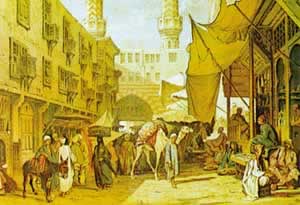 Although the Ottoman
Empire was a Muslim state, it granted its
subjects religious freedom. Thus a peaceful
multi-cultural mosaic was to be found in
Ottoman lands. As seen in this picture,
the state protected its citizens in accordance
with Muslim moral teaching, providing for
its poor no matter what religion they practised.
Although the Ottoman
Empire was a Muslim state, it granted its
subjects religious freedom. Thus a peaceful
multi-cultural mosaic was to be found in
Ottoman lands. As seen in this picture,
the state protected its citizens in accordance
with Muslim moral teaching, providing for
its poor no matter what religion they practised.
|
The most important reason for this was that although
the Ottoman Empire was an Islamic state administered
by Muslims, it had no desire to force its citizens
to adopt Islam. On the contrary, the Ottoman state
aimed at providing peace and security for non-Muslims,
and governing them in such a way that they would
be pleased with Islamic rule and justice.
 The mutual intolerance
of Catholics and Protestants in the 16th
and 17th centuries still continues in some
countries. The most innocent victims of
these conflicts have always been the children.
The mutual intolerance
of Catholics and Protestants in the 16th
and 17th centuries still continues in some
countries. The most innocent victims of
these conflicts have always been the children.
|
Other major states at the same time had much
cruder, oppressive and intolerant views of government.
The Kingdom of Spain could not tolerate the existence
of Muslims and Jews on the Spanish peninsula and
inflicted great violence on both communities.
In many other European countries, Jews were oppressed
just for being Jews (for instance they were imprisoned
in ghettoes), and were sometimes the victims of
mass slaughter (pogroms). Christians could not
even get on with one another: the fighting between
Protestants and Catholics in the 16th and 17th
centuries turned Europe into a bloodbath. The
30-Years War between 1618 and 1648 was one result
of this Catholic-Protestant conflict. As a result
of that war, central Europe became a battleground,
and in Germany alone, one-third of the population
of 15 million people was killed.
 The model for peace
in the Middle East is the Ottoman one of
multi-culturalism, with its conciliatory,
just and tolerant attitude based on the
moral teaching of the Qur'an. Above are
some news clippings from Turkish newspapers
and journals about the peaceful nature of
Ottoman rule.
The model for peace
in the Middle East is the Ottoman one of
multi-culturalism, with its conciliatory,
just and tolerant attitude based on the
moral teaching of the Qur'an. Above are
some news clippings from Turkish newspapers
and journals about the peaceful nature of
Ottoman rule. |
In such an environment, it is an indisputably
important truth that Ottoman rule was exceedingly
humane.
 |
A widely-recognized
expert on the Middle East, Edward
W. Said |
|
Many historians and political scientists have
drawn attention to this fact. One of these is
Columbia University's world-famous Middle East
expert Professor Edward Said. Originally from
a Jerusalem Christian family, he continues his
research far from his homeland in American universities.
In an interview in the Israeli newspaper Ha'aretz
he recommended the "Ottoman nation system" if
a permanent peace is to be built in the Middle
East. What he said was:
A Jewish minority can survive the way other minorities
in the Arab world survived.
it worked rather
well under the Ottoman Empire, with its millet
system. What they had then seems a lot more humane
than what we have now.27
History reveals that Islam is the only system
of belief to offer a just, tolerant and compassionate
way of government in the Middle East. The Pax
Ottomana, which came to an end with the withdrawal
of the Ottoman Empire from the region, has still
not been replaced.
For this reason, the way to attain peace in the
Middle East is to introduce the Ottoman model
characterised by tolerance and compromise, the
two fundamental teachings of the Qur'an. Islam,
truly followed, is the solution to all sorts of
violence of all kinds, conflicts, wars and terror
and a guarantor of peace, justice and tolerance.
 God is Ever-Gentle
with His servants.
God is Ever-Gentle
with His servants.
(Qur'an, 3:30) |

|
